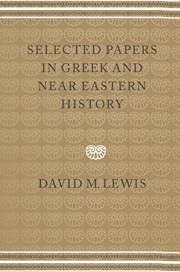Book contents
- Frontmatter
- Contents
- List of plates
- Preface
- Systems of reference
- GENERAL
- ATHENIAN
- 9 Public property in the city
- 10 Cleisthenes and Attica
- 11 Review of J. S. Traill, The Political Organization of Attica
- 12 Review of P. Siewert, Die Trittyen Attikas und die Heeresreform des Kleisthenes
- 13 The Kerameikos ostraka
- 14 Megakles and Eretria
- 15 The Athenian Coinage Decree
- 16 Athena's robe
- 17 The treaties with Leontini and Rhegion
- 18 Entrenchment-clauses in Attic decrees
- 19 Apollo Delios
- 20 After the profanation of the Mysteries
- 21 Aristophanes and politics
- 22 Who was Lysistrata?
- 23 A note on IG i2114 [= i3105]
- 24 The epigraphical evidence for the end of the Thirty
- 25 The financial offices of Eubulus and Lycurgus
- 26 The dating of Demosthenes' speeches
- 27 Law on the Lesser Panathenaia
- 28 The Athenian Rationes Centesimarum
- 29 The chronology of the Athenian New Style Coinage
- 30 Review of M. Thompson, The New Style Silver Coinage of Athens
- NEAR EASTERN
- Bibliography
- Publications of David M. Lewis
- Indexes
24 - The epigraphical evidence for the end of the Thirty
Published online by Cambridge University Press: 15 January 2010
- Frontmatter
- Contents
- List of plates
- Preface
- Systems of reference
- GENERAL
- ATHENIAN
- 9 Public property in the city
- 10 Cleisthenes and Attica
- 11 Review of J. S. Traill, The Political Organization of Attica
- 12 Review of P. Siewert, Die Trittyen Attikas und die Heeresreform des Kleisthenes
- 13 The Kerameikos ostraka
- 14 Megakles and Eretria
- 15 The Athenian Coinage Decree
- 16 Athena's robe
- 17 The treaties with Leontini and Rhegion
- 18 Entrenchment-clauses in Attic decrees
- 19 Apollo Delios
- 20 After the profanation of the Mysteries
- 21 Aristophanes and politics
- 22 Who was Lysistrata?
- 23 A note on IG i2114 [= i3105]
- 24 The epigraphical evidence for the end of the Thirty
- 25 The financial offices of Eubulus and Lycurgus
- 26 The dating of Demosthenes' speeches
- 27 Law on the Lesser Panathenaia
- 28 The Athenian Rationes Centesimarum
- 29 The chronology of the Athenian New Style Coinage
- 30 Review of M. Thompson, The New Style Silver Coinage of Athens
- NEAR EASTERN
- Bibliography
- Publications of David M. Lewis
- Indexes
Summary
There is a good deal of epigraphic evidence relevant to the end of the Thirty and to the restoration period which followed, but there is no single place in which it has been collected. I do not propose to discuss it all; some of the problems are very complex. That is the case, above all, with the documents relevant to the nomothetic process which started after the fall of the Four Hundred and rumbled on until the prosecution of the scribe Nikomachos; discussion of the fragments of the ‘walls’ and possible erasures on them is likely to be indefinitely prolonged. The notorious text, IGii210, concerning rewards for non–citizens, has, in my time, acquired the new fragments identified by Daphne Hereward. It has had a good deal of attention, and there is some measure of agreement about the size of the name–lists, though not about much else; what we perhaps needed even more was new fragments of the decree itself, without which there can be no certainty about the date or nature of the awards. The parallel text, the honours for citizens, the Heroes of Phyle, got off to a sensational start with its identification by || Raubitschek, but, perhaps rather surprisingly, no new fragments have been identified since, despite careful study of all fragmentary name–lists by Don Bradeen. Those who have studied the 390s will testify how important it would be to have a complete list of those with that particular claim to the eunola of the demos.
- Type
- Chapter
- Information
- Selected Papers in Greek and Near Eastern History , pp. 205 - 211Publisher: Cambridge University PressPrint publication year: 1997



